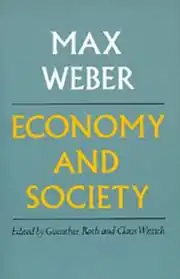Economy and Society
Economy and Society: An Outline of Interpretive Sociology (1921; German: Wirtschaft und Gesellschaft. Grundriß der verstehenden Soziologie; or simply Economy and Society) is a book by political economist and sociologist Max Weber, published posthumously in Germany by his wife Marianne. Alongside The Protestant Ethic and the Spirit of Capitalism (1905), it is considered to be one of Weber's most important works. Extremely broad in scope, the book covers numerous themes including religion, economics, politics, public administration, and sociology. A complete translation of the work was not published in English until 1968.
 Hardcover edition | |
| Author | Max Weber |
|---|---|
| Original title | Wirtschaft und Gesellschaft. Grundriß der verstehenden Soziologie |
| Translator | Guenther Roth, Claus Wittich |
| Country | United States |
| Language | English |
| Subject | Sociology |
| Genre | Non-fiction |
| Publisher | University of California Press |
Publication date | December 19, 1978 |
| Media type | |
| ISBN | 0-520-03500-3 |
In 1998, the International Sociological Association listed this work as the most important sociological book of the 20th century.[1]
Quotes
Sociology
Sociology…is a science concerning itself with the interpretive understanding of social action and thereby with a causal explanation of its course and consequences. We shall speak of "action" insofar as the acting individual attaches a subjective meaning to his behavior.[2]:4
Ideal types (pure types)
For the purposes of a typological scientific analysis it is convenient to treat all irrational, affectually determined elements of behavior as factors of deviation from a conceptually pure type of rational action. For example a panic on the stock exchange can be most conveniently analysed by attempting to determine first what the course of action would have been if it had not been influenced by irrational affects; it is then possible to introduce the irrational components as accounting for the observed deviations from this hypothetical course...Only in this way is it possible to assess the causal significance of irrational factors as accounting for the deviation of this type. The construction of a purely rational course of action in such cases serves the sociologist as a type (ideal type) which has the merit of clear understandability and lack of ambiguity. By comparison with this it is possible to understand the ways in which actual action is influenced by irrational factors of all sorts, such as affects and errors, in that they account for the deviation from the line of conduct which would be expected on hypothesis that the action were purely rational.[2]:6
Concepts
Orientations of social action
Social action, like all action, may be oriented in four ways:[2]:24–5
- Instrumentally rational (zweckrational): action "determined by expectations as to the behavior of objects in the environment and of other human beings; these expectations are used as "conditions" or "means" for the attainment of the actor's own rationally pursued and calculated ends."
- Value-rational (wertrational): action "determined by a conscious belief in the value for its own sake of some ethical, aesthetic, religious, or other form of behavior, independently of its prospects of success."
- Affectual (especially emotional): action "determined by the actor's specific affects and feeling states."
- Traditional: action "determined by ingrained habituation."
Religion
In part 2, chapter VI, Weber distinguishes three ideal types of religious activity:[3]
- World-flying mysticism;[4]:544–5
- World-rejecting asceticism;[4]:542 and
- Inner-worldly asceticism.[4]:542
He also separated magic as pre-religious activity.
References
- "ISA - International Sociological Association: Books of the Century". International Sociological Association. 1998. Archived from the original on 2012-10-10. Retrieved 2012-07-25.
- Weber, Max. 1968 [1921]. "Basic Sociological Terms." In Economy and Society: An Outline of Interpretive Sociology. New York: Bedminster Press. p. 4.
- Zaleski, Pawel. 2010. "Ideal Types in Max Weber's Sociology of Religion: Some Theoretical Inspirations for a Study of the Religious Field." Polish Sociological Review 3(171).
- Weber, Max. 1968 [1912]. "Asceticism, Mysticism and Salvation." In Economy and Society: An Outline of Interpretive Sociology. New York: Bedminster Press.
External links
| Wikiquote has quotations related to: Economy and Society |
- Weber, Max. 1922. Economy and Society, 2 v. Description.
- Camic, Charles, Philip S. Gorski, and David M. Trubek, ed. 2005. Max Weber's Economy and Society: A Critical Companion. Stanford University Press. ISBN 0804747172.
- Economy and Society at the Internet Archive